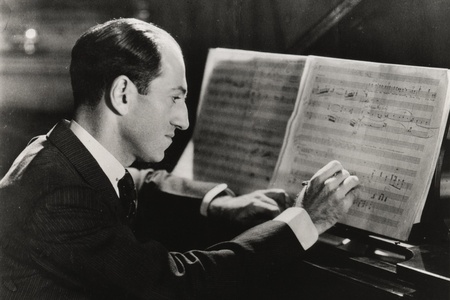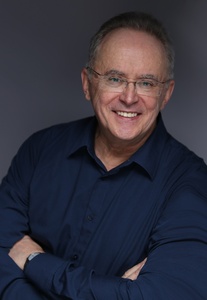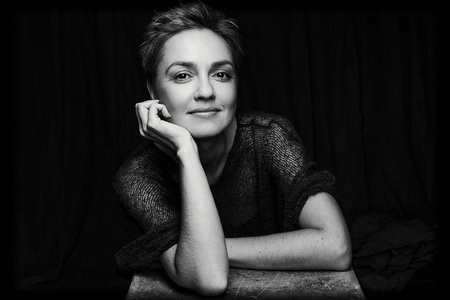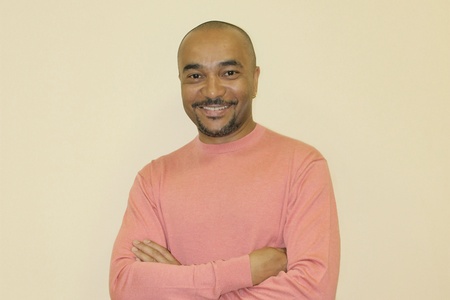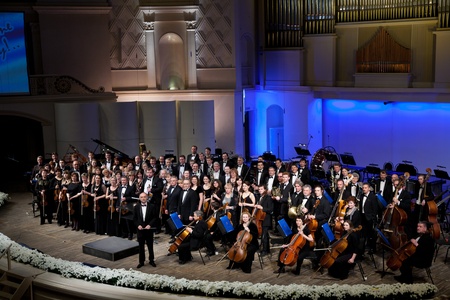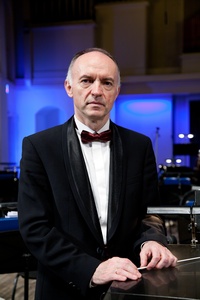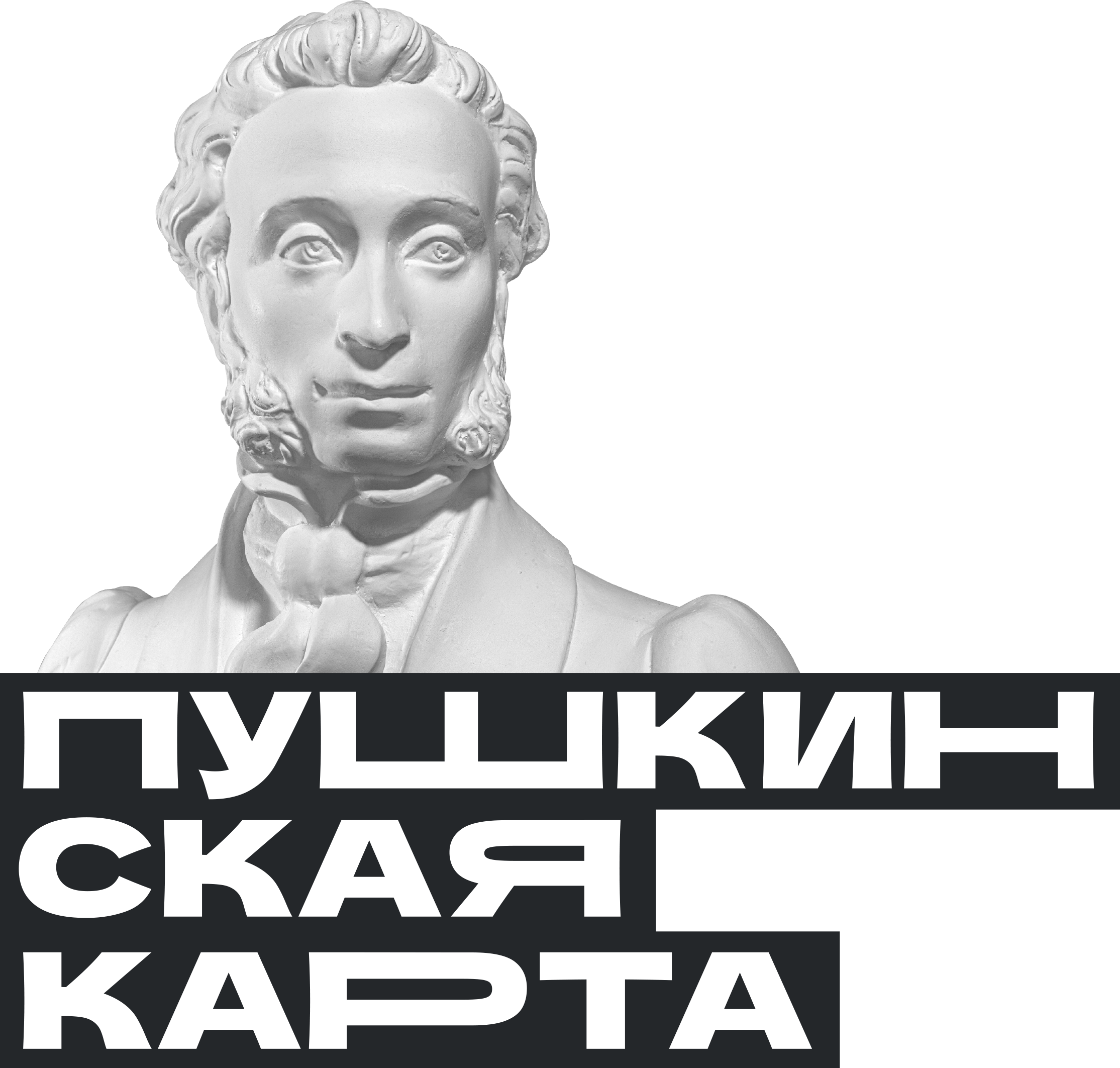Igor Nazaruk (piano)
Anna Buturlina (soprano)
Grigory Siyatvinda (spoken word artist)
Russian State Symphony Cinema Orchestra
Sergey Skripka, conductor
Program:
Gershwin
Overture to the musical "Girl Crazy"
Piano Concerto in F
An American in Paris for orchestra
Nazaruk
"An American in Russia"
concerto for Piano and Orchestra on Gershwin's themes
"Embraceable You"
Suite on a Themes of Gershwin's songs for soprano, piano and orchestra
Poems by L. Hughes, W. Whitman, P. Verlaine, I. Nazaruk

Anna Buturlina
Anna Buturlina, jazz singer and musical actress, was born in 1977 in Moscow. She studied at Prokofiev Music School, Gnessin Moscow Special School of Music, and Gnessin Russian Academy of Music. Winner of international competitions of jazz singers Lady Summertime in Kajaani (Finland) and Jazz Voices in Klaipeda (Lithuania), Grand Prix winner of Jazz Singers Competition in Moscow. She made her debut at the age of 19 with the Anatoly Kroll’s jazz orchestra MKS Big Band, and subsequently collaborated with Oleg Lundstrem State Chamber Orchestra of Jazz Music and with such prominent Russian jazz performers as Alexey Kuznetsov, Georgy Garanyan, Daniil Kramer, Igor Butman, Lev Kushnir, Alex Rostotsky, Yakov Okun, Vladimir Danilin, Ivan Farmakovsky, and others.
Anna Buturlina has performed with the Russian State Symphony Cinema Orchestra under the baton of Sergei Skripka, and with big bands from various Russian cities. She has starred in the title role of Penelope, or 2+2, production of the Stas Namin Music and Drama Theatre with music by Gennady Gladkov. She has appeared with solo programs in famous jazz clubs in Moscow and at leading concert venues in Russia. In May 2015, she participated in a concert dedicated to the 70th anniversary of the Victory in World War II at the UN General Assembly Hall in New York with the Oleg Lundstrem Jazz Orchestra conducted by Boris Frumkin. With the Svetlanov Symphony Orchestra and conductor Vladimir Jurowski, she performed excerpts from Alfred Schnittke's music for the television film Little Tragedies in 2019 and appears at a concert to mark Sofia Gubaidulina's 90th birthday in 2021.
Anna Buturlina is a participant of many jazz festivals in Russian cities and abroad, such as Jazz at Hermitage Garden, Usadba. Jazz and many others. She was an organiser of the 1st Moscow Jazz Singers Competition (2009). She also records vocal parts for feature films and animation films. Her major works include records for Disney animation films, voicing Tiana (The Princess and the Frog) and Elsa (Cold Heart). The singer’s solo albums are Black Coffee (2002), My Favorite Songs (2006), All That Jazz (2017), Beware of the Music (2017) and The Key to the Kingdom (2017).
Russian State Symphony Cinema Orchestra
The band traces its history to the times of the "great silent", when in September 1924 the Moscow ARS Cinema on Tverskaya Street replaced their accompanying pianist by an orchestra. As musical accompaniment of films was a success with audiences, the orchestra, led by composer and conductor David Block, soon went on to play in other cinemas as well. Since then, the orchestra has never lost its connection with the film industry. In 1938, the orchestra, which had had no staff musicians until then, got assigned to the Soyuzdetfilm studio of children’s films. In 1943, the Soyuzdetfilm orchestra and choir became an autonomous structure of the national scale.
The orchestra has contributed to the creation of the best of pre-war and wartime films by outstanding directors such as Sergei Eisenstein, Vsevolod Pudovkin, Grigory Alexandrov, Grigory Kozintsev, and Ivan Pyrev. During the war, it was evacuated to Central Asia, continuing to be involved in virtually every Soviet film and frontline chronicle. The year 1944 was marked by two historic events: the orchestra recorded Sergei Prokofiev's music for Sergei Eisenstein's film Ivan the Terrible and gave a concert marking its 20th anniversary at the Column Hall of the House of Unions, which opened with the newly recorded music by Dmitry Shostakovich for Leo Arnstam's film Zoya.
In the post-war decades, the orchestra recorded music for many films, including Grigory Chukhray's Ballad of a Soldier (music by Mikhail Ziv), Sergei Bondarchuk's War and Peace (music by Vyacheslav Ovchinnikov), Operation Y and Shurik's Other Adventures, Kidnapping, Caucasian Style, The Diamond Arm, Twelve Chairs, Ivan Vasilievich Changes Profession by Leonid Gaidai (music by Alexander Zatsepin), The Very Same Munchhausen by Mark Zakharov (music by Alexei Rybnikov), Mary Poppins, Goodbye! by Leonid Kvinikhidze (music by Maxim Dunaevsky), The Meeting Place Cannot Be Changed by Stanislav Govorukhin (music by Yevgeny Gevorgyan), Moscow Does Not Believe In Tears by Vladimir Menshov (music by Sergei Nikitin), The Pokrovsky Gate by Mikhail Kozakov (music by Georgy Garanyan) and many others.
Since 1993, the orchestra has been headed by Sergey Skripka, who has managed to preserve it and sustain its high performing standards. The orchestra’s recent highlights include recording music by Eduard Artemyev, Yuri Krasavin, Artem Vasilyev, Angelo Badalamenti and other composers for films and series such as Sunstroke by Nikita Mikhalkov, The Nutcracker in 3D, The Postman's White Nights by Andrei Konchalovsky, Liquidation, Quiet Flows The Don, and Life and Fate by Sergei Ursuliak, The Brest Fortress and Spitak by Alexander Kott, Dostoevskiy, Demons, and The Parvus Memorandum by Vladimir Khotinenko, Weekend and The End of a Beautiful Epoch by Stanislav Govorukhin, The Spacewalker by Dmitry Kiselev, Legend No. 17 and Flight Crew by Nikolai Lebedev, Stalingrad by Fedor Bondarchuk, The Road to Calvary by Konstantin Khudyakov, The Spirit of Sonora (based on the rock opera The Star and Death of Joaquin Murieta) The Liturgy of the Heathens by Alexei Rybnikov, The Bronze Horseman of Russia by Vasily Livanov, Sobibor by Konstantin Khabensky and many others.
Russia’s best composers have collaborated with the orchestra, including Isaac Dunayevsky, Sergei Prokofiev, Dmitri Shostakovich, Georgy Sviridov, Edison Denisov, Alfred Schnittke, Sofia Gubaidulina, Andrei Petrov, Rodion Shchedrin, Andrei Eshpai, Giya Kancheli, Eduard Artemyev, Gennady Gladkov, Vladimir Dashkevich, Evgeny Doga, and others. In various years, it has performed under the baton of David Block, Alexander Gauk, Vasily Nebolsin, Grigory Gamburg, Nikolai Anosov, Ariy Pazovsky, Nikolai Golovanov, Gennady Rozhdestvensky, Evgeny Svetlanov, Mark Ermler, Gaziz Dugashev, Veronika Dudarova, Yuri Silantyev, Arnold Roitman, Emin Khachaturian, Yuri Nikolaevsky, Vladimir Vasiliev, Martin Nersesian, David Shtilman, Konstantin Krimets, and Nikolai Sokolov. The orchestra’s concerts have featured David Oistrakh, Emil Gilels, Ivan Kozlovsky, Mstislav Rostropovich, Galina Vishnevskaya, Boris Gmyria, Vladimir Krainev, Daniel Shafran, Alexander Slobodianik, Mikhail Pletnev, and Dmitry Hvorostovsky.
The orchestra is highly mobile and flexible, capable of playing in large and small ensembles, transforming into pop and jazz groups, and combining concerts with studio recordings. It regularly participates in the Moscow Philharmonic's subscription programs, the best of which have been Live Screen Music at the Tchaikovsky Concert Hall and Cinema without Borders at the Philharmonia-2. For more than two decades, the orchestra collaborated with the outstanding musicologist and lecturer Svetlana Vinogradova. The musicians have been regular participants of several music festivals including December Nights of Svyatoslav Richter, Music of Friends, Moscow Autumn, Slavic Bazaar, Festival of Russian Culture in India, and major television concert projects, such as Phantom of the Opera on Channel One Russia and The Big Opera on TV Kultura. In 2013, the orchestra received the Russian Government Grant.
Sergey Skripka
Most of Sergey Skripka’s artistic career is associated with the Russian State Symphony Cinema Orchestra. He joined the company in 1977, as a student of Prof. Leo Ginzburg at the Moscow Conservatory, and has been the orchestra’s Artistic Director and Chief Conductor since 1993. Led by Sergey Skripka, the orchestra has recorded soundtracks for most Russian, and also some foreign, films. Over the years, the maestro’s work has been greatly appreciated by his colleagues, becoming an integral part of the national film industry.
The musician has strong artistic links to famous film makers. Outstanding directors Eldar Ryazanov, Nikita Mikhalkov, Sergey Solovyov, Pyotr Todorovsky, famous actors, composers, and screenwriters have repeatedly appeared on stage with the maestro and his orchestra. Film lovers might remember his brilliant programmes celebrating milestone birthdays of Gennady Gladkov, Eduard Artemyev, Alexander Zatsepin, Alexey Rybnikov, Vladimir Dashkevich, Polad Bülbüloğlu, Maxim Dunaevsky as well as commemoration concerts of Tikhon Khrennikov, Andrey Petrov, Isaak Schwartz, Yevgeny Ptichkin, Oscar Feltsman, Mikael Tariverdiev, Nikita Bogoslovsky, Kirill Molchanov, Georgy Garanian, and Rolan Bykov. Since 2006, Sergey Skripka and the Cinema Orchestra have been running Live Screen Music, a unique personal subscription series at the Moscow Philharmonic.
Sergey Skripka has collaborated with many Russian ensembles, touring both in Russia and abroad. He has performed and made records with famous soloists including Mikhail Pletnev, Dmitry Hvorostovsky, Sergey Sudzilovsky, Alexander Vedernikov, Lyubov Kazarnovskaya, Alexey Lubimov, Andrey Diev, Rodion Zamuruev, Alexander Gindin, Alexey Nabiulin, Alena Baeva, Gaik Kazazyan, Nikita Borisoglebsky, and others. Since 1975, he has headed the Zhukovsky Symphony Orchestra. For 27 years, he also was a Professor of Orchestra Conducting Department at the Gnessin Russian Academy of Music.
The conductor’s repertoire includes works of different eras and genres, from baroque to contemporary music, from high classics to best pop pieces. The maestro premiered the oratorio St. Mark Passion by Reinhard Keiser in Russia and made the first CD recordings of some pieces by Reinhold Glière, Alexander Mosolov, Vissarion Shebalin, and Edison Denisov. In 2018, Sergey Skripka conducted the world premiere of the requiem Nine Steps to Transformation by Eduard Artemyev. He regularly serves as a jury member at film festivals and music competitions. He also belongs to NIKA and Golden Eagle film academies as well as the Russian Union of Cinematographers. Sergey Skripka is Merited Artist of the Russian Federation (1993), People’s Artist of the Russian Federation (1998), Honorary Citizen of the city of Zhukovsky (2004), recipient of the Russian Government Prize for Culture (2010) and holder of the Order of Honor (2016).

